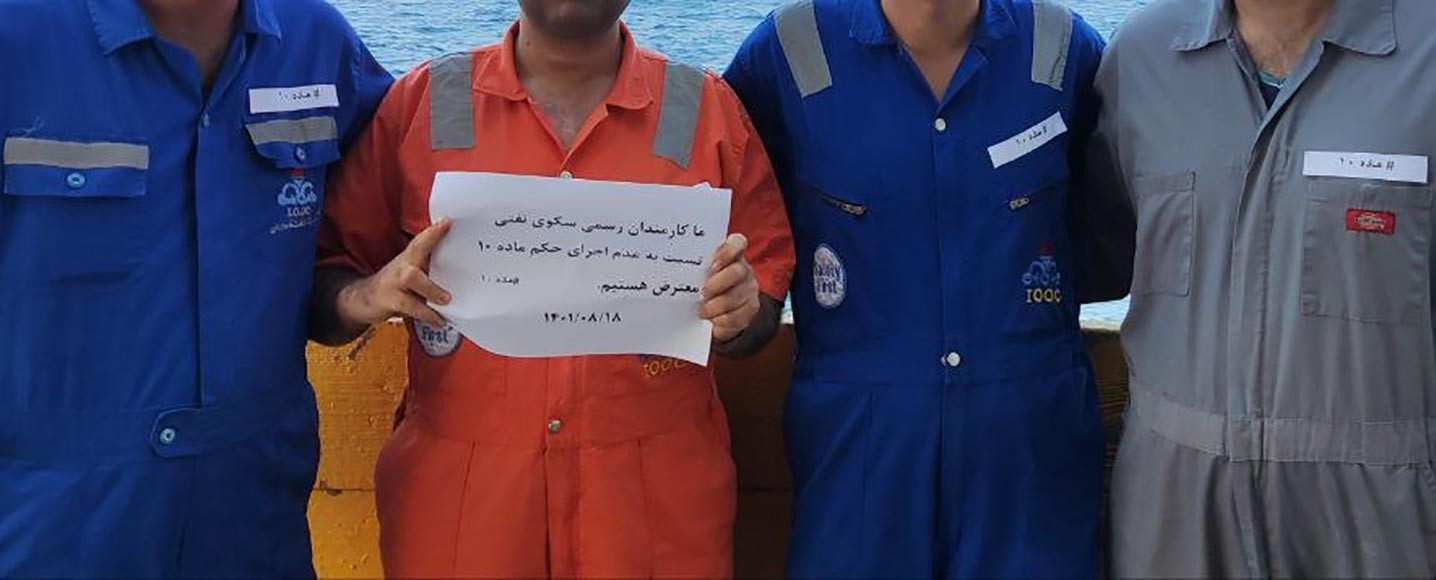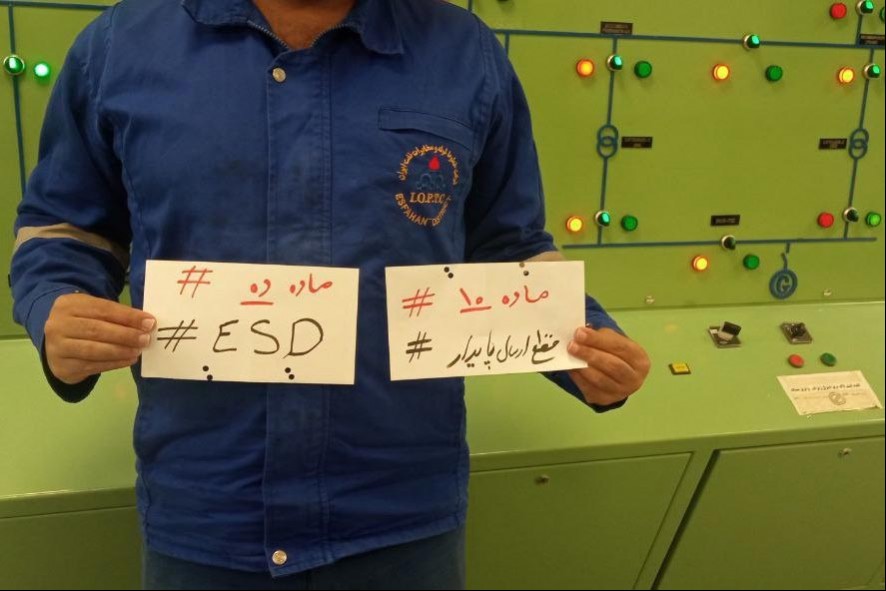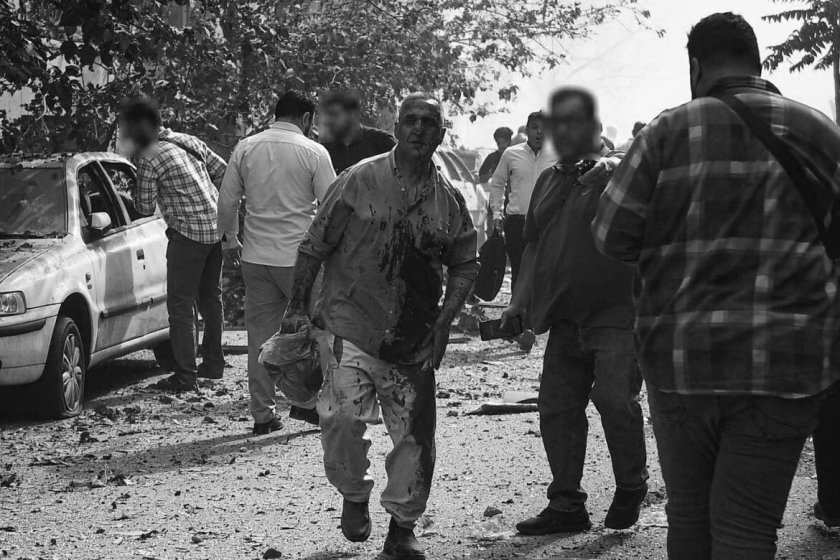Iranian Oil Workers spoke to Evrensel: Political and economic demands converge
The Organising Council of Iranian Oil Workers answered Evrensel's questions about the ongoing protests and strikes. The workers explained that they are struggling against both the regime and economic conditions.

Fotoğraf: İranlı petrol işçileri (Arşiv)
E. AVA
Following the killing of Mahsa Amini by the morality police in Iran, the protests that started across the country against the entire structure of the Iranian regime, boycotts of classes, labour strikes and the shuttering of shopkeepers at certain times have left behind about 90 days.
In this process, workers from many business lines participated in the protests and went on strike in their factories. Workers in the oil industry, which is one of the strategic industries in Iran, were the ones who started the strikes across the country. The strike wave, which started with the closure of the roads leading to the factory by the workers in Asaluye in the first days, has spread throughout the country.
Since 2017, oil workers in the South have played a very strategic and important role both in terms of organising and mobilising other business sectors. The waves of organisation and strikes have been combined not only with economic demands, but also with the anti-Iranian regime movement that is taking place across the country. Today we can hear workers chanting "We don't want the Islamic Republic of Iran" and "Death to the dictator".
The strikes and protests of the oil workers in the South, despite all the pressures, have mobilised oil workers in Senendej and Tehran, and in recent weeks we have witnessed that workers in these provinces have also gone on strike. These strikes, combined with political demands such as the cessation of executions and the release of prisoners in addition to economic demands, have been important and decisive in the ongoing popular movement in Iran.
The workers' strikes were also embraced by students, and slogans such as "The oil worker is our teacher" were heard on campuses. Since 2017, the strikes and actions of the oil workers, which have been progressing stitch by stitch by paying heavy prices, have borne fruit within this movement.
The current part of this ongoing and progressive process was reported by the Iranian Oil Workers Organisation Council for Evrensel. The workers did not want their names to be published and hid their faces in the photographs for security reasons.
What are the current conditions of strikes in different sectors and stages of oil production?
Workers had previously issued a statement in which they, along with everyone else in Iran, expressed their outrage at the murder of Mahsa Amini by the moral police, expressed their support for the people's struggle against organised state violence against women, against poverty and corruption. In this statement they announced that they would stop work and go on strike against all these events.
After the revolutionary popular uprising, the first protests and strikes in the petroleum sector were launched by the project workers in parts of Bushehr, Damavand and Hemgan Petrochemical plants in Asaluye, Kangan Petro Refinery and the second phase of Abadan Refinery. The strike in these areas lasted three days in the first phase. Because the strike was violently suppressed and more than 250 workers were arrested and sent to prison. After this three-day strike, especially the drivers of the Abadan Refinery fuel transport, the workers of the Pardis Petrochemical Repair Department in Asaluye, the contract workers of the Pars Oil and Gas Factory working on 37 gas platforms in the South Pars region, the workers of the Arundan Gas and Oil Factory, the workers working on the rigs of the National Drilling Company, the workers of the oil extraction first stage operation site, the project workers of the 11th South Pars Refinery. South Pars Refinery project workers, Masjid Suleiman Refinery workers, and in recent days there have been protests and strikes at the 5th and 6th refineries.
In the past few days, our fellow contract workers in the 11, 13, 15, 16, 22 and 24 stages of Kangan have announced their preparations for a strike. In addition, the Organising Council of Oil Workers called for and supported the three-day 'General strike, general action' against the Iranian regime on 5-6 and 7 December across the country, in addition to the widespread protests and strikes in the southern regions, in which our fellow workers at Senendej Petrochemical Plant participated.
We can briefly tell you that the general atmosphere that dominates all stages and phases in the petroleum sector is completely ready for action and strike.

What kind of pressures have you been subjected to in the petroleum sector in this process? How is the organisation of the strikes progressing despite the pressures?
As you may know, the petroleum sector is very sensitive and important for the state. Therefore, the pressure is heavier and different.
The departments, stages and operation centres in all areas of petrochemicals and refineries are run by security forces and police. Since 20 years ago until today, 40 per cent of the employees of the main and important stages of the oil centres are security guards, military personnel and their families. This is even more pronounced in the case of official or contract workers. They are obliged to monitor all movements and actions of other workers and to report any protests and dissatisfaction to the security services immediately.
But the fact is that in recent years, with the exception of a small number of official workers, the rest have not been burdened by orders and have themselves protested against the current situation and have organised and protested and demonstrated in various ways in recent years. In recent years we have witnessed greater solidarity between contract and non-contract workers, which has led to the formation and work of the Oil Workers' Organising Council, which is also the voice of the workers. Apart from arrests, another part of the repression comes in the form of dismissals. In addition to the violent exploitation of workers, short-term labour contracts and threats to dismiss workers means the systematic oppression of workers who are already working for very little wages in one of the most important industries. The first job of the boss and those in charge is to immediately dismiss workers who are dissatisfied with the situation, who say that this order cannot go on like this. But despite all this, the stages and departments are determined to move forward by strengthening the network of communication with each other.

What are the demands of the workers in these strikes?
The main demand of the oil workers is the abolition of the subcontractor system. In addition to this demand, other urgent demands expressed by our friends in different departments in their campaigns are the abolition of temporary and fixed-term contracts and the establishment of permanent employment contracts, an increase in wages, the implementation of Article 10 of the Petroleum Powers Law (Article 10 of the Petroleum Powers Law has not been implemented. Article 10 of the Petroleum Forces Law (since this article is not implemented, workers are not paid for the job descriptions and departments for which they will receive wages), improvement of working and living conditions, raising the health standard to an acceptable level, providing free health services to all workers, improving the quality of food in canteens, increasing the safety of working environments, ending the oppressive rules prevailing in the workplace and granting the right to organise, assemble and protest, immediate reinstatement and release of arrested and dismissed workers.
Forwarding to the next article...
10 seconds remaining






Follow Evrensel